|
|
|
Sort Order |
|
|
|
Items / Page
|
|
|
|
|
|
|
| Srl | Item |
| 1 |
ID:
148031
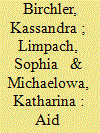

|
|
|
|
|
| Summary/Abstract |
Many argue that autocratic regimes allocate revenues from foreign aid with the aim of stabilizing their rule rather than serving economic and social development. However, donors often condition foreign aid on reforms in recipient states. We argue that when those conditions for reform focus on participative processes and government accountability, they positively affect democratization. We evaluate our claim based on different types of World Bank and IMF lending programs for a panel of 100 low- and middle-income countries over the years 1980–2011. Our results suggest that aid positively affects democratization when it strengthens domestic accountability mechanisms and thereby reduces its fungibility for recipients. The World Bank and the IMF’s poverty reduction strategy programs provide a notable case of this effect.
|
|
|
|
|
|
|
|
|
|
|
|
|
|
|
|
| 2 |
ID:
148042


|
|
|
|
|
| Summary/Abstract |
We revisit Gartzke and Weisiger's (2014) claim that development and dyadic difference, rather than democracy or a strong democratic community, drive peace and conflict in the international system. In so doing, we identify important inconsistencies in their theoretical argument. We also find extensive instability and errors in their empirical tests. Corrected analyses support the conclusion that a materially strong global democratic community dampens the onset of militarized violence. In addition, we show that an accurate interpretation of models including Gartzke and Weisiger's “dyadic difference” variable actually supports the conclusion that dyadic democracy reduces conflict. We recommend moving toward a more productive analysis of the interdependence between regime dynamics, political economy, and violence. This involves better theorizing about the emergence of market structures and their pacifying effects, treating global economic and democratic effects as complementary, research designs that carefully adhere to logic, and a continued practice of sharing replication files.
|
|
|
|
|
|
|
|
|
|
|
|
|
|
|
|
| 3 |
ID:
148036


|
|
|
|
|
| Summary/Abstract |
This article examines how civilian defense militias shape violence during civil war. We define civilian defense forces as a sedentary and defensive form of pro-government militia that incumbents often use to harness the participation of civilians during a counterinsurgency campaign. We argue that civilian defense forces reduce the problem of insurgent identification. This leads to a reduction in state violence against civilians. However, we also claim that these actors undermine civilian support for insurgents, which leads to an increase in rebel violence against civilians and overall intensification of conflict. A statistical analysis of government and rebel violence against civilians from 1981 to 2005 and a qualitative assessment of a civilian defense force operating in Iraq from 2005 to 2009 offer strong support for our theoretical claims. These findings provide further insight into pro-government militias and their effects on violence. They also have wider ethical implications for the use of civilian collaborators during civil war.
|
|
|
|
|
|
|
|
|
|
|
|
|
|
|
|
| 4 |
ID:
148030
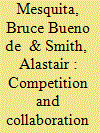

|
|
|
|
|
| Summary/Abstract |
Despite the extensive empirical and theoretical research into foreign aid, there remains little or no formal analysis of aid giving in a competitive donor environment. We endeavor to fill this lacuna with both a model and empirical analysis of aid-for-policy deals with rival aid donors. The model indicates that a dominant donor captures all the surplus from any deal. We test several hypotheses that follow from the model. We demonstrate that the United States paid less (in constant dollars) and gained more in policy terms through aid before the Soviet Union became a significant aid player. Once the Soviet Union became a player in the international aid arena, the United States paid more for aid and got less by way of security concessions from recipients.
|
|
|
|
|
|
|
|
|
|
|
|
|
|
|
|
| 5 |
ID:
148044
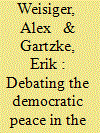

|
|
|
|
|
| Summary/Abstract |
In recent publications, we inquire whether the pacifying effects that are often attributed to democracy are likely to continue to hold as the world democratizes. Critics raise questions about the theoretical logic and especially the empirical results that we present. After clarifying our theoretical arguments, we discuss the central empirical critiques. We demonstrate that Crescenzi and Kadera’s (2016) finding of a pacifying effect of systemic democracy is driven not, as they claim, by the use of a better measure of systemic democracy, but by the unjustified decision to omit systemic regime difference from their analysis. Once we restore this variable, we find no evidence that democratization produces a system-level pacifying effect. We agree with our critics that the inclusion of dyadic regime difference produced misleading estimates for lower-threshold democracy. Because our arguments presume the historical existence of a dyadic democratic peace, however, this observation, if anything, resolves an apparent anomaly for our claims. Finally, we explain that Choi (2016) misunderstands the argument that systemic regime-type difference seeks to capture; we show that his proposed alternative neither captures our concept of interest nor accomplishes what he claims.
|
|
|
|
|
|
|
|
|
|
|
|
|
|
|
|
| 6 |
ID:
148039
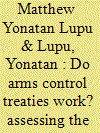

|
|
|
|
|
| Summary/Abstract |
How do international arms control treaties influence state policies? This article investigates this question by analyzing the efficacy of the nuclear Nonproliferation Treaty (NPT). Despite fierce debate over the last several decades, scholars still lack a full understanding of whether or not the treaty “works.” This debate persists, in part, because existing studies suffer from a key limitation: they are not designed to infer a causal connection between NPT membership and nuclear proliferation. Prior research cannot determine whether membership in the treaty restrains states from developing nuclear weapons or simply reflects existing preferences. To address this limitation, this article accounts for selection effects by using a measure of states’ ex ante treaty commitment preferences. Our analysis of nuclear proliferation from 1970 to 2000 provides evidence that the NPT has played a key role in curbing the spread of nuclear weapons. Even after accounting for strategic selection into the treaty, NPT ratification is robustly associated with a lower likelihood of pursuing nuclear weapons. Our results not only matter for debates over the NPT and nonproliferation but also have broad implications for the study of how international institutions affect international politics.
|
|
|
|
|
|
|
|
|
|
|
|
|
|
|
|
| 7 |
ID:
148033


|
|
|
|
|
| Summary/Abstract |
Some argue that the right kinds of institutions mitigate, or even prevent, the development of “natural resource curses.” Rulers with access to resource wealth, however, are unlikely to adopt such institutions, because doing so would undermine their discretionary power. We examine this proposition by testing whether countries with access to natural resource wealth prove less likely to adopt transparency-promoting Freedom of Information (FOI) laws. Using panel data on 139 countries between 1980 and 2012 (33 years), we find that, after accounting for current levels of democracy and the quality of institutions, countries deriving rents from natural resource are, indeed, less likely to adopt FOI laws. We also find that oil, but not other kinds of resources, is robustly related to a lower probability of adopting FOI laws. However, in countries with strong democracy and high institutional quality, higher income from resources is positively associated with the chance of adopting FOI laws. This suggests that rulers of countries with high resource wealth need to face high political constraints already before they adopt institutional changes. It follows that global policy aimed at increasing transparency within resource-wealthy states should focus efforts on strengthening democracy in ways that increase political competition.
|
|
|
|
|
|
|
|
|
|
|
|
|
|
|
|
| 8 |
ID:
148038


|
|
|
|
|
| Summary/Abstract |
This article examines whether the quantitative literature on the causes of nuclear proliferation successfully identifies variables that explain existing patterns of proliferation or improve our ability to predict proliferation. Using extreme bounds analysis, cross-validation, and random forests, I examine 31 variables that the extant literature considers significant determinants of proliferation. While some variables perform better than others, most fail to offer strong explanations for existing patterns of proliferation. Even fewer improve our ability to predict proliferation. It follows that the existing quantitative literature on proliferation produces more tentative findings than scholars typically understand.
|
|
|
|
|
|
|
|
|
|
|
|
|
|
|
|
| 9 |
ID:
148043


|
|
|
|
|
| Summary/Abstract |
Do democracies become less peaceful with one another as the overall number of democratic states in the international system increases? Gartzke and Weisiger (2013, 2014) claim that they do. However, I argue that their evidence stems from a mathematical error in their statistical model. Once I correct that error, their findings no longer hold. In other words, when Gartzke and Weisiger's model receives proper specification, no dyadic and systemic difference persists, while democracy emerges as a pacifying factor that reduces the likelihood of interstate dispute.
|
|
|
|
|
|
|
|
|
|
|
|
|
|
|
|
| 10 |
ID:
148041


|
|
|
|
|
| Summary/Abstract |
A prominent international-relations theory posits that mutual optimism, due to two sides holding divergent estimates of their relative bargaining power, causes interstate conflict. We develop a theory of mutual optimism in which conflicting bargaining power estimates arise from asymmetric information about which, if any, third parties will join either side in a military dispute. We contend that secret alliances can generate mutual optimism, which increases the probability of conflict. By exploiting secret alliances as a measurable source of private information, we provide the first systematic test of mutual optimism that directly assesses a state's secret capabilities. Optimism exists when a state's secret allies are more numerous or powerful than anticipated by opponents. Our empirical tests—as well as robustness checks—strongly support our theoretical expectation. We conclude that mutual optimism is an empirically, as well as theoretically, important cause of interstate conflict.
|
|
|
|
|
|
|
|
|
|
|
|
|
|
|
|
| 11 |
ID:
148040
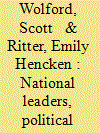

|
|
|
|
|
| Summary/Abstract |
States frequently form military coalitions, and these collaborations matter a great deal for international politics, yet their origins are poorly understood. Building coalitions in international crises improves military prospects. At the same time, it requires policy concessions to compensate partners. We show that a national leader’s job security affects her willingness to make this tradeoff. First, politically insecure leaders are more willing to form coalitions than secure leaders. The former face greater incentives to accept tradeoffs in order to bolster their chances of victory and thereby improve their chances of remaining in power. Second, politically insecure leaders are also less selective in their choice of partners. Their willingness to make larger policy concessions leads them to form coalitions with states of increasingly divergent foreign policy preferences. A sample of crises from 1951-1999 provides statistical support for these arguments.
|
|
|
|
|
|
|
|
|
|
|
|
|
|
|
|
| 12 |
ID:
148032
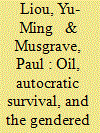

|
|
|
|
|
| Summary/Abstract |
Economic development generally promotes women’s autonomy. Yet women in resource-rich autocracies fare more poorly than women in similarly wealthy industrial and postindustrial states. Some attribute this puzzling outcome to cultural causes, describing the apparent link between restrictions on women’s autonomy in resource-rich countries (especially in the Middle East) as spurious. Others argue that oil and gas rents cause a gendered resource curse through macroeconomic mechanisms. By contrast, we explain the association as a consequence of a political mechanism. We propose a theory of autocratic survival via antisocial policies chosen for the harms they inflict on targeted groups. Autocrats need to placate ideologically motivated members of their winning coalition. Antisocial policies serve as a costly and visible measure of rulers’ fidelity to these winning coalition members. Resource rents enable rulers to afford such policies, which would be infeasible in tax-reliant regimes. Restricting women’s autonomy thus forms part of a strategy of autocratic rule in resource-rich autocracies. Using quantitative evidence, we demonstrate that variations in women’s autonomy correlate with variations in oil income per capita in cross-country regressions. To trace variations within cases, we present case studies of Saudi Arabia and Iran to demonstrate processes consonant with our theory.
|
|
|
|
|
|
|
|
|
|
|
|
|
|
|
|
| 13 |
ID:
148027
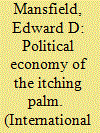

|
|
|
|
|
| Summary/Abstract |
In this paper, I conduct the first cross-national study of the political economy of gratuities. Existing efforts to explain cross-national variations in tipping either approach this topic from a social-psychological or an economic perspective. In contrast, I argue that the diffusion of American tipping norms contributes to cross-national tipping patterns and that visits by foreign travelers to the United States are the central path through which these norms spread overseas. Consistent with this argument, I find that non-immigrant admissions to the United States are strongly and positively linked to restaurant tipping rates. Further, increases in such admissions have spurred a rise in tipping rates. From the standpoint of the domestic political economy, various observers argue that patrons leave larger tips in poorer countries and countries marked by poor labor conditions. However, my results provide little indication that these factors directly bear on cross-national tipping patterns. Instead, the existence of a service charge constitutes the only domestic factor that directly affects tipping rates.
|
|
|
|
|
|
|
|
|
|
|
|
|
|
|
|
| 14 |
ID:
148034
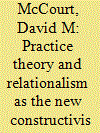

|
|
|
|
|
| Summary/Abstract |
In this theory note, I address two new approaches in international relations theory gaining adherents and producing insightful applications: practice theory and relationalism. Practice theory draws attention to everyday logics in world politics. It stresses how international actors are driven less by abstract notions of the national interest, identities, or preferences than by context-dependent practical imperatives. Relationalism rejects the idea that entities—like states and international organizations—are the basic units of world politics. It replaces them with a focus on ongoing processes. Noting similarities in their arguments to those advanced by early constructivists, I argue that, taken together, practice theory and relationalism represent the New Constructivism in International Relations (IR). A practice–relational turn became necessary because the meaning of constructivism narrowed over time, becoming tied to a specific scientific ontology focusing on the role of identity, norms, and culture in world politics. This ontology unduly narrowed constructivism’s theoretical lenses, which practice theory and relationalism productively reopen.
|
|
|
|
|
|
|
|
|
|
|
|
|
|
|
|
| 15 |
ID:
148028


|
|
|
|
|
| Summary/Abstract |
In 2006, Norway launched a stand-alone process to negotiate a ban on cluster munitions. The United Kingdom (UK) reluctantly joined the process to keep it within acceptable bounds. The UK acted as a spoiler in the negotiations. Yet, in the end, it agreed to ban all cluster munitions and became a champion of the new treaty. Why? I argue that two factors constrained and enticed the UK to go along with the process. First, small states and non-governmental organizations (NGOs) structured the negotiations to disadvantage potential opponents. Second, NGOs also used shaming and praising to define the “desirable” UK policy. Not only did the UK accept a comprehensive ban, but it also started championing it as a result of two mechanisms—“cooperative bargaining” at the end of negotiations that led to a fair compromise and “mobilization of pride” by NGOs praising it for supporting the new norm. Whereas usually the success of weak actors in international negotiations is attributed to the persuasive power of their arguments, I show that strategic action by small states and NGOs may prove crucial in engineering the conditions both for their success and the rhetorical entrapment of stronger actors, such as the UK.
|
|
|
|
|
|
|
|
|
|
|
|
|
|
|
|
| 16 |
ID:
148037


|
|
|
|
|
| Summary/Abstract |
Prominent theories stress the role of economic grievances in promoting political instability and conflict. They often point to inequality in the ownership of land as a primary source of such grievances. However, cross-national empirical studies fail to confirm a link between unequal distributions of land and civil war. These findings, I contend, stem from problems in theorizing and measuring rural inequality. This article distinguishes between the effects of total landholding inequality and the concentration of land ownership on conflict. Total landholding inequality, which includes landlessness, captures economic grievances in the countryside and is positively associated with conflict. Gini coefficients of landholding concentration capture both grievances and landowners’ capacity to organize as rebels and a repressive rural elite. The relationship between landholding Ginis and conflict is shaped like an inverted “U”: inequality correlates with an increasing likelihood of conflict, but as the concentration of landholdings reaches very high levels, the likelihood of conflict decreases with the formation of a small repressive class of landowners. Results of cross-national regressions—using new data on total landholding inequality and the concentration of landholdings—confirm these predictions. My findings provide evidence that landholding inequality is an important underlying cause of civil war.
|
|
|
|
|
|
|
|
|
|
|
|
|
|
|
|
| 17 |
ID:
148035


|
|
|
|
|
| Summary/Abstract |
Recent debates about the state of International Relations (IR) raise the possibility that the field is losing its theoretical innovativeness due to professional incentives to churn out publications. Yet the claims made about IR far outstrip the availability of empirical data. Important assertions derive from a handful of examples rather than systematic evidence. This paper presents an investigation of what gets taught to doctoral students of IR in the United States. I find, among other things, that the type of research most frequently published in IR journals differs in systematic ways from the type of research taught to graduate students. In turn, this raises important questions such as whether certain types of valuable research face a relative disadvantage when it comes to getting published in the first place. The evidence also points to the partial separation of IR from Political Science in the United States. Further, it casts doubt on the growing practice of using Google Scholar to measure research influence. A new metric, which I call the Training Influence Score (TIS), supports the analysis.
|
|
|
|
|
|
|
|
|
|
|
|
|
|
|
|
| 18 |
ID:
148029
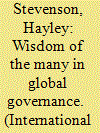

|
|
|
|
|
| Summary/Abstract |
A growing body of literature highlights moral reasons for embracing global democracy. This literature justifies democracy on the grounds of its intrinsic value. But democracy also has instrumental value: the rule of the many is epistemically superior to the rule of one or the rule of the few. I draw on the tradition of epistemic democracy to develop an instrumentalist justification for democratizing global governance. I develop an epistemic-democratic framework for evaluating political institutions—one composed of three principles. The likelihood of making correct decisions within institutions of global governance increases when those institutions maximize (1) human development and capacity for participation; (2) their internal cognitive diversity; and (3) public opportunities for sharing objective and subjective knowledge. Applying this framework to global governance produces a better understanding of the nature and extent of its “democratic deficit,” as well as the actions required to address this deficit.
|
|
|
|
|
|
|
|
|
|
|
|
|
|
|
|
|
|
|
|
|